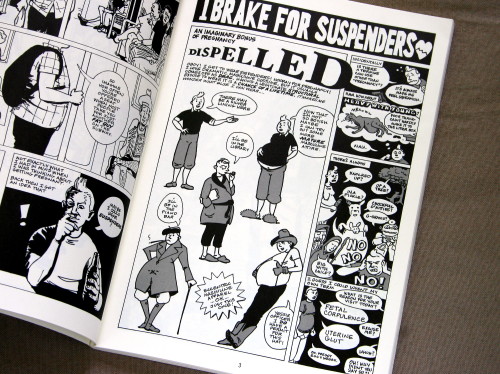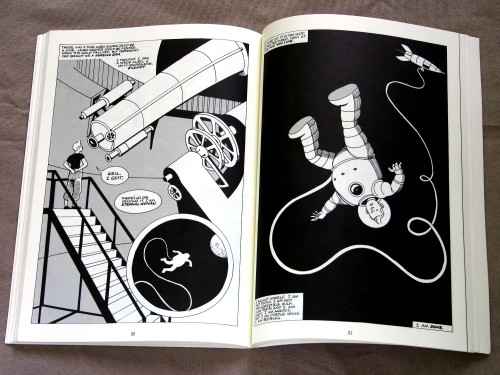With a title like Pregnant Butch, you can probably guess that this is a memoir taking a decidedly non-majority perspective on a pretty common event. Now, I haven't looked up the proportion of the population that will at some point vent live young from their undercarriage, but it's going to be high. High enough, in fact, to lead to one of the most interesting aspects of Pregnant Butch - a world in which everyone has a very solid expectation of what the protagonist's experiences should be; a world that has to be lived in by that protagonist - regardless of how little she agrees that this is what her experiences manifestly are.
Consequentially, each aspect of the experience (pregnant, and butch, if you like) become a kind of contrast medium that lets a reader inspect what's odd about the other. This is a book about cultural (and medical) attitudes to motherhood, about butch identity and female masculinity, about queer experience in a heteronormative domain, and about the isolation of feeling personally at odds with all of those things while in a situation the world demands that you find wonderful.
Yeah. There's a lot in here.
The subtitle of Pregnant Butch is "Nine long months spent in drag", a phrase that manages to capture a lot of what I just wrote in a wry little smirk. The "long" there does some gentle sacred-cow tipping, shot through with a sense of weary frustration, and the casting of maternity as drag backs it all up while pointing to gender as theatre. If I were being an utter prick, I'd suggest you didn't need to read the book after grokking the title. But you do - it's rich and funny, and chock fucking full of feels. Plus, it has a lot to say about the way we construct identity, and is about as non-mawkish a pregnancy memoir as you could conceivably hope for.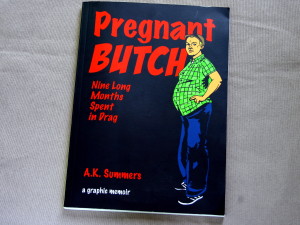
In fact, Pregnant Butch begins profoundly unsentimentally, with a journey on the subway where a newly-pregnant Teek (Summers' nickname) complains of being routinely mistaken for "just another fat guy" before breaking into the realisation that she could finally have an excuse to wear suspenders. The book's first emotional hook is not the sacred miracle of the womb, but the crushing disappointment of looking like a clown in an outfit you've always dreamed of being able to pull off.
From there it pulls to back-story, framing it as a Tintin reference (Teek is frequently drawn as Tintin), deliberately tongue in cheek and playful with gender. We move to college and more knowing mockery of a younger self, before hitting the near past and the experience of feeling shamed by looking old. Awareness of age is framed as a catalyst to initially wanting a child, and the first crisis in a series that structure the book.
Age, however, is a minor theme, and clears the decks quickly for the more significant crisis: the fear of how pregnancy's seemingly mandatory femininity will interact with butch's female masculinity. Will butchness preclude fertility, and will maternity efface butch?
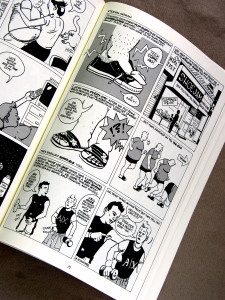 This is the key crisis that Pregnant Butch attempts to work out, and its answer is - unsurprisingly - complicated. It settles on the notion that pregnancy stretched Teek's butch identity almost to breaking, and it returned as a more elastic female masculinity.
This is the key crisis that Pregnant Butch attempts to work out, and its answer is - unsurprisingly - complicated. It settles on the notion that pregnancy stretched Teek's butch identity almost to breaking, and it returned as a more elastic female masculinity.
This idea of female masculinity is one of the more interesting things the book explores, and one I knew the least about.
I do have a slight reservation, though, around some of its handling of gender identity. There's a section that talks about the disappearance of butch lesbians, positing that the butch identity has been superseded by FTM trans, and a diminishment of the concept of socially constructed gender in favour of something more biologically deterministic. It's gentle, and it's caveated, but it also feels like a wonky conflation. I'm no expert, but I'd struggle to locate trans as a kind of butch apotheosis, or as making butch obsolete.
Of course, Summers isn't quite saying that - it's all folded up into a rumination on her own gender identity, prompted by finding out the sex of the baby. It just feels like something potentially huge gets elided into a couple of panels, a problematic simplification. I'd actually quite like to have read more about this line of thinking, and the experiences that led to it. Without showing the working, I'm left looking very sceptically at the whistle-stop conclusion.
Again though, it's scrutinising Teek's female masculinity that brings this about, and it is interesting. There, she's asking herself "how can unaltered butchness compete with such intensity", as she considers a kind of hormonally supercharged pantomime version of trans masculinity. She's chipping away at the idea that as a butch her masculinity may somehow lack authenticity, a situation that being a pregnant butch throws into sharper crisis.
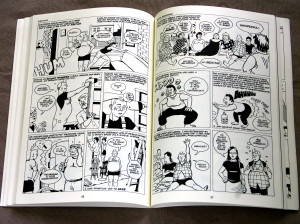 This crisis feeling pervades a good deal of the story, often hinging on the assertion "to be butch is to do it yourself". This forms the springboard for a rejection of medicalised birth in favour of "natural" midwifery, for DIY home insemination, for Teeks' ballsy world-weariness and eye-rolling at much of the trappings of commercial maternity, and for the sense of emasculation as the physical constraints of pregnancy render her less able to in fact do things herself.
This crisis feeling pervades a good deal of the story, often hinging on the assertion "to be butch is to do it yourself". This forms the springboard for a rejection of medicalised birth in favour of "natural" midwifery, for DIY home insemination, for Teeks' ballsy world-weariness and eye-rolling at much of the trappings of commercial maternity, and for the sense of emasculation as the physical constraints of pregnancy render her less able to in fact do things herself.
It's in this way that a weekend putting up shelves comes to figure for an inflection point in capability, moving from climbing ladders to a blithe indifference at not being able to as pregnancy progresses. This transition from defiance to an exasperated (qualified) acceptance is basically the story of the pregnancy. So much so that in one of its crescendo moments, a rare pair of whole page spreads is spent with Teek visualising her Tintin self has she looks down an enormous telescope at her pregnant self, a bulbous astronaut untethered in space, and announcing:
Well, I quit.
There's no use denying it. I am Eternal Woman.
...I am not myself. I am not the Incredible Hulk. I am tears and I am snot. I am anemic and I am purple veins. I am boobies.
I am done.
You could see the telescope as phallic, paired to the more masculine self, the space suit as a kind of profoundly fragile womb analogy. But although this is a kind of turning point in accepting that adrift-in-space feeling, it's not the end, and Teek does not abandon the self-reliance.
The actual process of labour is painted as just as much a psychological struggle as physical one. Teek returns to the image of breaking waves she'd earlier dismissed in a prenatal class, and from there to childhood fear of swimming and the high dive, compiling impossible things. She calls the crisis out most clearly as a tension between agency and passivity: "Why does it need me to let it happen".
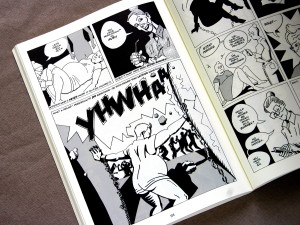 Of course, that's not the end. One of the most endearing traits of Pregnant Butch is the playful tone Summers brings to memoir's refusal to be neat. She won't offer us a pat ending, a flourish on those neat little beats and epigrams, not if it didn't happen that way. Instead, she'll wink to us over the details, or use this continuation after an implicit point of finish as a lovely little imperfect cadence.
Of course, that's not the end. One of the most endearing traits of Pregnant Butch is the playful tone Summers brings to memoir's refusal to be neat. She won't offer us a pat ending, a flourish on those neat little beats and epigrams, not if it didn't happen that way. Instead, she'll wink to us over the details, or use this continuation after an implicit point of finish as a lovely little imperfect cadence.
The best of these has her approaching labour as the New York power cuts hit, wryly talking to the reader about how this would be a really bad time to have the baby. Narrative cliche demands that this be the time, but Summers won't offer us cliche. Instead we cut to her slumped on a couch, page composition echoing the bathtub panel, grumpily wondering whether this pregnancy is going to go on forever.
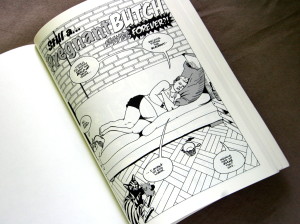 This gives a wonderful sense of "More? Really? You have to be kidding" to the subsequent pages that tell the story of her labour.
This gives a wonderful sense of "More? Really? You have to be kidding" to the subsequent pages that tell the story of her labour.
It's cannily done, and brings a wonderful sense of emotional immediacy.
I loved Pregnant Butch for that, for bringing me right up to empathy with something I can't really hope to ever quite understand on a personal level. It's warm, intimate, and and funny, and I think I learned a lot.


